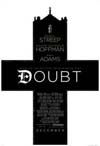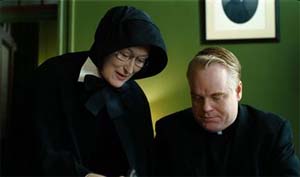The
Curious Case of Benjamin Button
Fantastic Mr. Fox
Gran Torino
Harry Potter and the Half Blood Prince
The Hurt Locker
The
Informant!
Julie and Julia
Milk
The Reader
Serious Man
Film Reviews from 2008
Film
Reviews from 2007
Film Reviews
from 2006
Doubt
I had the privilege of seeing the original Broadway production of the play in 2005. This may have hindered my appreciation of the film. The tight, intimate setting of a live theater with four actors has been diminished by “opening up” the film, with many scenes of a Catholic world of another era: churches full of parishioners, school children in their uniforms, nuns in their habits. Shanley effectively conveys the contrast between the Spartan nuns at their modest convent supper and a much more elaborate dinner with prime rib and drinks enjoyed by the priests in their rectory. Other touches, including a live cat and mouse game, and exploding light bulbs, seem to take away from the human drama going on. In Doubt, Sister Aloysius suspects Father Flynn of molesting an eighth grade boy, the only African-American in the school. Unflinchingly, Aloysius goes after Flynn, trying to get him to confess to what he may have done with the boy. Flynn denies any wrongdoing. Young Sister James, while initially suspicious of Flynn, becomes convinced that he did no wrong. Aloysius meets with Mrs. Davis to tell her of her suspicions, and attempt to enlist her assistance in removing Fr. Flynn. While instrumental to the story, the issue of sexual misconduct is not the main element of Shanley’s plot. This is not just another story of the alleged sexual misconduct of a priest. As the title implies, it’s a play about ideas. Without proof, Aloysius is certain that Flynn is guilty, and goes after him with a vengeance. This is indicative of the way she approaches life; things are either black or white, people are either good or bad. She knows the children (and most everyone else) are terrified of her. She is OK with that. It’s her role to keep order. Yet she knows that in the church there is an order, a hierarchy. In that hierarchy she is below the bishop, monsignor, and priest. She cannot challenge them. No one would believe her word over that of a priest.
Streep is a great actress, and she does well here. Her Sister Aloysius is rigid and unflinching. She is the focal point of every scene. It’s not a flattering portrait of women religious of the era. She’s so tight; you think she’s going to crack. Eventually she does, with a surprising revelation. It’s a devastating moment and Streep rises to the occasion. Hoffman, another great actor, is less effective as Flynn. I had trouble believing him; he lacks charm and warmth. The inevitable confrontation between Flynn and Aloysius is not as effective as on stage. Rather than let the two great actors go at it, Shanley keeps them fussing over things: windows that need to be closed, light bulbs that burst. More effective is the confrontation between Aloysius and Mrs. Miller. Mrs. Miller reacts to Aloysius’ allegations in ways that surprise and shock Aloysius. She has a dignity about her, and an ability to deal with ambiguity in a way that Aloysius does not. Amy Adams is also quite good as the young Sister James, struggling to be a good sister and teacher in a manner quite foreign to her superior. Doubt is a good film that could have been a great one. Still, there’s a great deal for the audience to ponder here: certainty vs. doubt, a new model of ministry vs. the old, a disparity between clerical and lay, men and women in the church, and the movement of priests from parish to parish without investigating issues of misconduct. The ending is still appropriately unsettling. Shanley leaves it to the audience to determine what actually happened. Whatever the viewer believes, there is more doubt than certainty. Tom Condon, OP
|
The USCCB Office for Film & Broadcasting
classification is A-III -- adults. The Motion Picture Association
of America rating is PG-13 -- parents strongly cautioned. Some
material may be inappropriate for children under 13. |



 John
Patrick Shanley brings his own Pulitzer Prize winning drama,
set in the Bronx in 1964, to the screen. It has a powerhouse
cast of Meryl Streep as Sister Aloysius, a tough school principal,
Philip Seymour Hoffman as Fr. Flynn, a new associate pastor
in the parish, Amy Adams as young Sister James, and Viola Davis
in a small but key role as the mother of a boy who may have
been molested.
John
Patrick Shanley brings his own Pulitzer Prize winning drama,
set in the Bronx in 1964, to the screen. It has a powerhouse
cast of Meryl Streep as Sister Aloysius, a tough school principal,
Philip Seymour Hoffman as Fr. Flynn, a new associate pastor
in the parish, Amy Adams as young Sister James, and Viola Davis
in a small but key role as the mother of a boy who may have
been molested.  Flynn
and Sister James represent a younger viewpoint in their ministerial
outlook. They want to be friendly with the children. They
saw the church more in touch with contemporary society than opposed
to it. In a conversation about the Christmas pageant, the
two wanted contemporary songs such as “Frosty the Snowman.” Sister
Aloysius shudders at the thought, pointing out the demonic origins
of Frosty.
Flynn
and Sister James represent a younger viewpoint in their ministerial
outlook. They want to be friendly with the children. They
saw the church more in touch with contemporary society than opposed
to it. In a conversation about the Christmas pageant, the
two wanted contemporary songs such as “Frosty the Snowman.” Sister
Aloysius shudders at the thought, pointing out the demonic origins
of Frosty.